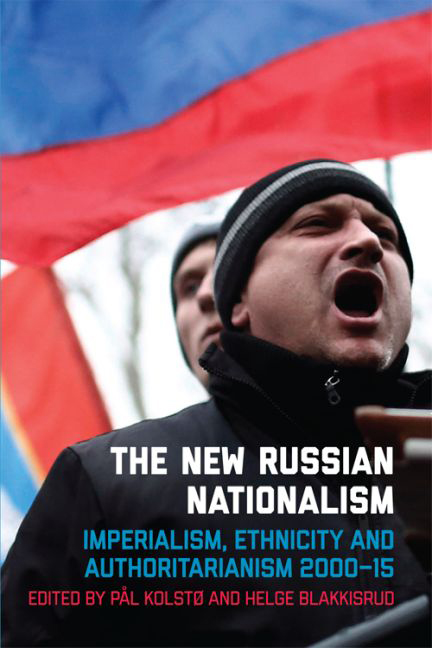Book contents
- Frontmatter
- Contents
- List of Figures
- List of Tables
- Acknowledgements
- Notes on Contributors
- Introduction: Russian nationalism is back – but precisely what does that mean?
- 1 The ethnification of Russian nationalism
- 2 The imperial syndrome and its influence on Russian nationalism
- 3 Radical nationalists from the start of Medvedev's presidency to the war in Donbas: True till death?
- 4 Russian ethnic nationalism and religion today
- 5 Everyday nationalism in Russia in European context: Moscow residents’ perceptions of ethnic minority migrants and migration
- 6 Backing the USSR 2.0: Russia's ethnic minorities and expansionist ethnic Russian nationalism
- 7 Rallying ’round the leader more than the flag: Changes in Russian nationalist public opinion 2013–14
- 8 How nationalism and machine politics mix in Russia
- 9 Blurring the boundary between civic and ethnic: The Kremlin's new approach to national identity under Putin's third term
- 10 Russia as an anti-liberal European civilisation
- 11 Ethnicity and nationhood on Russian state-aligned television: Contextualising geopolitical crisis
- 12 The place of economics in Russian national identity debates
- Bibliography
- Index
12 - The place of economics in Russian national identity debates
- Frontmatter
- Contents
- List of Figures
- List of Tables
- Acknowledgements
- Notes on Contributors
- Introduction: Russian nationalism is back – but precisely what does that mean?
- 1 The ethnification of Russian nationalism
- 2 The imperial syndrome and its influence on Russian nationalism
- 3 Radical nationalists from the start of Medvedev's presidency to the war in Donbas: True till death?
- 4 Russian ethnic nationalism and religion today
- 5 Everyday nationalism in Russia in European context: Moscow residents’ perceptions of ethnic minority migrants and migration
- 6 Backing the USSR 2.0: Russia's ethnic minorities and expansionist ethnic Russian nationalism
- 7 Rallying ’round the leader more than the flag: Changes in Russian nationalist public opinion 2013–14
- 8 How nationalism and machine politics mix in Russia
- 9 Blurring the boundary between civic and ethnic: The Kremlin's new approach to national identity under Putin's third term
- 10 Russia as an anti-liberal European civilisation
- 11 Ethnicity and nationhood on Russian state-aligned television: Contextualising geopolitical crisis
- 12 The place of economics in Russian national identity debates
- Bibliography
- Index
Summary
‘We are a rich country of poor people. And this is an intolerable situation’.
(Vladimir Putin, 28 February 2000)This chapter traces the role of economics in intellectual debates over Russian national identity. On one side are the modernisers who believe that the only way to restore Russia's prosperity and standing in the world is to embrace Western market institutions. On the other side are nationalists who believe that economic integration will erode the political institutions and cultural norms that are central to Russian identity. They argue that erecting barriers to Western economic influence, and creating an alternate trading bloc, are necessary to prevent the exploitation of the Russian economy and even the possible destruction of the Russian state. The chapter traces these debates from the chaotic reforms of the 1990s through what appeared to be a winning Putin model in the 2000s, and then the uncertain waters after the 2008 financial crash, culminating with the Western sanctions (and Russian counter-sanctions) imposed after the annexation of Crimea in 2014.
It is possible to imagine a middle position, a third way between the modernisers and the nationalists: a distinctively Russian economic model that combines elements of trade openness with measures to ensure Russia's long-term development. However, Russia has by and large failed to come up with its own third way model, and has instead remained trapped between the polarities of integration and autarky.
Vladimir Putin was trying to build a third-way model of state corporatism plus international integration in the period 2000–8, but the model showed its limitations in the stagnation following the 2008 financial crash. He then shifted to an alternative approach in the form of the Eurasian Economic Union: a regional trading bloc that would be under Russia's control and would be to a degree insulated from the global economic institutions dominated by the US and its allies.
- Type
- Chapter
- Information
- The New Russian NationalismImperialism, Ethnicity and Authoritarianism 2000–2015, pp. 336 - 361Publisher: Edinburgh University PressPrint publication year: 2016



